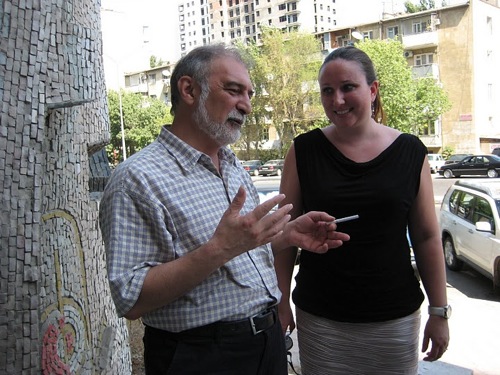This is a guest blog entry from Rebecca Vincent, Advocacy Assistant for Azerbaijan and the Europe Program Manager at ARTICLE 19. For more information, please contact Rebecca Vincent at: rebecca [ at ] article19 [ dot ] org.
BLOG POST: Extracted from the new report titled Free Expression under Attack: Azerbaijan’s Deteriorating Media Environment.
The report is the result of joint freedom of expression mission undertaken from 7 to 9 September, 2010. The mission representatives met with journalists and bloggers, collected testimonies from survivors of violent attacks, and family members of imprisoned journalists and bloggers, including Hikmet Hajizade, the father of imprisoned blogger Adnan Hajizade. The mission representatives also held meetings with civil society activists and government representatives.

Hikmet Hajizade, the father of imprisoned blogger Adnan Hajizade
The deteriorating freedom of expression situation in the country is the result of a number of worrisome trends, including the continuing practice of imprisoning journalists and bloggers in connection with expressing critical opinions; the enduring cycle of violence against journalists and impunity for those who commit these acts; and the continued existence of criminal defamation provisions in domestic law. These trends are particularly concerning in the context of the upcoming parliamentary elections, set to take place on 7 November 2010.
The mission representatives found that deep pessimism within the media community is somewhat counter-balanced by the energy and enthusiasm prevailing among bloggers and others writing for online media. When the traditional media are under the control of the government or face pressure from the authorities, online media has been filling the void and has been able to ensure interesting coverage of current events.
New media versus traditional media
The place of bloggers and citizen journalists in Azerbaijan is not clear. The head of the Presidential Administration’s Social and Political Department, Ali Hasanov, publically stated that “bloggers are not journalists,” as a way to dismiss international criticism calling for the release of the two jailed bloggers.
Some bloggers with whom the mission met complained about not being recognized as journalists and then not being able to enjoy the rights and social benefits given to journalists. However, a requirement that bloggers register with the Ministry of Justice would present a danger of creating one category of bloggers recognized by the authorities, and another category of “illegal bloggers,” who would become more vulnerable to repression.
Bloggers have indeed encountered problems in trying to access official information since they are not considered to be journalists. But many independent and opposition journalists also face this issue.
A dynamic blogosphere
There was variation among the figures provided to the mission by its interlocutors. According to official figures, one third of the population (2.5 million persons) has access to the Internet. The blogosphere has dramatically expanded during the past three years. Ten thousand bloggers are reported to be active, although it seems that closer to several hundred are influential in the Azerbaijani blogosphere.
A bloggers’ forum, Bloqosfer 2010, was held after the mission was completed, from 10 to 12 September 2010. It was seen as the crowning of the development of the Azerbaijani blogosphere over the past three years, or as a new beginning. According to Elnur Kelbizadeh, it was attended by about 50 bloggers and served as an opportunity for bloggers, new media specialists and other Internet experts, as well as representatives from the industry and civil society to identify as a community and strengthen their links. Representatives of the authorities attended the event. Some bloggers complained that the case of the two imprisoned bloggers was not raised during the forum, but others explained that the social aspect of blogging was stressed over political issues.
Some dialogue has been taking place online between bloggers from Azerbaijan, Armenia and Georgia. According to one blogger who spoke at an international conference held in Budapest from 20 to 22 September 2010, if something negative happened to bloggers in Azerbaijan, neighboring countries such as Armenia and Georgia could follow suit
Vibrant online media
There was encouraging evidence of a vibrant and growing online media, including Internet television stations such as Obyektiv TV, ANTV, and Kanal 13. Those using digital media to report, campaign and inform displayed an optimism which bodes well for the future. Young people have taken the potential of Web 2.0 by storm. Some of the most popular websites, such as Tac.az, have started to address issues relevant to Azerbaijan’s youth. Havaodsutorpag.com, open.az, contact.az, and irfs.az also have an interesting audience. Facebook has now about 170,000 users in the country, most of whom are 18 to 30 years old. Twitter is less popular, even though the “Green Revolution” in Iran contributed to making it more known in Azerbaijan, according to bloggers who met with the mission.
With the November 2010 parliamentary elections coming up, some Facebook groups and pages have popped up, created by political figures such as political analyst and potential candidate Ilgar Mammadov or Erkin Gedirli, a lawyer whose group has now more than 400 members. Given the lack of media pluralism and problems with access to the media by members of the political opposition, online and social media could provide a new avenue for the government's critics to express themselves.
The nine organisations that participated in the joint mission are members of the International Partnership Group for Azerbaijan, and actively work towards the promotion and protection of human rights. The participating organisations included: ARTICLE 19; Freedom House; Index on Censorship; International Federation of Journalists; Media Diversity Institute; Open Society Foundations; Press Now; Reporters Without Borders; and World Association of Newspapers and News Publishers.



